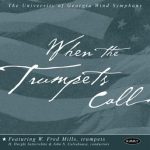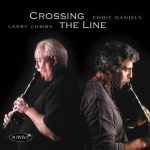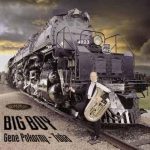MATT HALL – TROMBONE, COMPOSER, ARRANGER, PRODUCER
CHARLIE ARBELAEZ – ALTO SAXOPHONE, COMPOSER
LOUIS VALENZUELA – GUITAR
JASON SHATTIL – PIANO
MACKENZIE LEIGHTON – UPRIGHT BASS
KEVIN KANNER – DRUMS
——
For Matt Hall, Jazz is a journey—a lifelong endeavor spearheaded by the trombone. A cool trip that began in Kingsport, in his home state of Tennessee. A student of Rick Simerly, Matt studied the Masters: Urbie Green, Frank Rosolino, Carl Fontana, JJ Johnson and of course Bill Watrous. At age 21 he joined the United State Marine Corps where he would move to Southern California. It’s where he met Charlie Arbalaez whose alto sax chops were are already gaining great momentum. During his time in the service, Hall would gain a chair in the highly prestigious USMC Jazz Orchestra, touring the country. After an enlistment with the Corps, Matt and Charlie tackled SUNY Purchase Conservatory in New York, studying with John Faddis before earning Masters degrees on their instruments under the direction of Bill Yeager at San Diego State University.
This debut album, pays tribute to Matt’s Great Aunt Joan and her exasperation over Matt’s constant practicing during his childhood always exclaiming: “I hope to my never”! From the blues-driven opener, Biscuits and Gravy, to the completely burnin’ Cherokee contrafact closer that embodies moving to New York City, Charlie’s Harley, this album swings on many levels from start to finish, offering many twists and turns throughout. Fellow trombonists and brass players alike will particularly love and appreciate Matt’s tip of the cap to Bill Watrous and Rick Simerly with a breath-taking cadenza titled 3G—Matt and Charlie’s NYC apartment number overlooking the George Washington Bridge in Manhattan.
Enjoy the journey!
-Dave Scott, Emmy award-winning TV feature writer, Jazz Trombonist, Composer
REVIEW:
Trombonist and composer Matt Hall’s debut as a leader is a tremendously satisfying program of originals, plus one standard. Hall leads a dynamite quintet that shows itself adept at grooving in a variety of styles: “Biscuits & Gravy” is a refined blues that never quite tips over into funk, but consistently nods at it; the title track is loping, midtempo hard bop; “Charlie’s Harley” is a Charlie Parker tribute written on the “Cherokee” changes; “Spearhead” has a slightly greasy, second-line feel to it in the head, but then settles into a relaxed swing for the solos. Hall has that most enviable skill in trombonists: the ability to play bop at tempo and without any loss of clarity or note separation. And his sidemen are all absolutely killing it here as well. This album would find a welcome home in any library’s jazz collection.
-Rick Anderson for CD HOTLIST: New Releases for Music Libraries
REVIEW:
And another neat thing about the record business falling apart… This set has the sound and feel of any number of gray market reissues on labels like American Jazz Classics that are recycling essential 50s blowing dates at bargain prices by the pound. A sound and feel from pre-Beatles and pre-message music when all a solid stack of tunes had to do was make you feel good—that’s the tradition this date follows in. You don’t even need a snifter of Courvoisier by your side to get into it. And if the biz hadn’t fallen apart, records like this would probably continue not to get made, at all. Well done.
-MIDWEST RECORD
REVIEW:
Matt Hall swings his trombone like it was hanging from a tree with his snappy team of Charlie Arbelaez/as, Louis Valenzuela/g, Jason Shattil/p, Mackenzie Leighton/b and Kevin Kanner/dr through a mix of originals.
Hall shows his impressive chops on his dramatic “3G” that leads in to the fun cruise of his own “Charlie’s Harley”. The band is reminiscent of vintage Jazz Messengers as Kanner and Leighton lay down an easy hard bop shuffle on “Biscuits & Gravy” and strut under Valenzuela’s clean guitar lines on the bluesy “The Thing About Sloan Hill”. Shattil’s fingers dance on the ivories under Hall’s big brass on the pretty read of “Deep In A Dream” while Arbelaez sears through Kanner’s traffic like a Formula 1 driver as he digs deep on “Spearhead”. Classic sounds that sound as fresh as this morning’s freshly baked almond flavored croissant.
-George Harris for Jazz Weekly
REVIEW:
Matt Hall and his ensemble swing right out the gate. “Biscuits & Gravy” is Matt Hall’s original composition and it quickly sets the tone for this album. The bass of Mackenzie Leighton walks briskly beneath bright, swinging horn solos and Matt Hall’s trombone tells his story with gusto. Kevin Kanner uses drums to powerfully push the ensemble forward. When Jason Shattil takes his solo on piano, it leaves no doubt that Hall has assembled a group of connoisseur jazz cats to interpret his arrangements. Hall is a composer of note. His song, “I Hope to my Never” is the title of this album and a tribute to his Great Aunt Joan. Years ago, she expressed exasperation over Matt’s constant practicing and used to exclaim, “I hope to my never.” Now her poetic phrase of frustration has become Track #2 of Matt’s debut album. It’s a very melodic tune with a slow swing tempo and an opening line that reminds me of the song, I thought About You. Matt Hall’s trombone skills skip along smoothly as the melody dances. “The Thing About Sloan Hill” is another tune that swings and features the smooth guitar mastery of Louis Valenzuela. Mackenzie Leighton steps from the background into the forefront to sing his big, bad, bass song. The tune “Spearhead” is another one of my favorites and also an original composition by Matt Hall. In fact, he has penned seven out of the nine songs on this album and they are all well-written and beautifully arranged. “No Going Back” was composed by alto saxophonist, Charlie Arbelaez and it’s another sparkling gem on this production. Played at lightning speed, the track gives a platform for the soloists to shine, starting with Valenzuela on guitar. When Arbelaez steps into the spotlight, he takes us on a spirited ride, as does Jason Shattil on the 88-keys. Hall and Arbelaez blend perfectly, promoting melody with horn harmonies at a swift pace. Suddenly, Kevin Kanner silences the group with his drum solo and impresses me with his dexterity and technical skills. This group loves to ‘swing’ and so do I. Consequently, this journalist was perfectly happy with this album from beginning to end.
-Musical Memoirs
REVIEW:
This past February, trombonist Matt Hall released his debut album, I Hope To My Neverthrough Summit Records. Released Feb. 18, the nine-song record is an enjoyable first outing for the United States Marine Corps veteran, who also spent some time performing with the USMC Jazz Orchestra during his time with the Marines. That is in large part to the record’s featured arrangements, which will be discussed shortly. While the arrangements that make up the record’s body form a strong foundation for the presentation, the record is not perfect. Its lack of any background on the songs detracts from the listening experience to a point. This will be discussed a little later. The record’s production puts the finishing touch to the whole and when considered along with the arrangements, serves to make the presentation a sort of record that so many jazz fans hope to take in every year.
I Hope To My Never is an impressive debut outing for trombonist and USMC veteran Matt Hall. Its success comes in large part through its featured arrangements. The arrangements are in large part originals. The only cover featured in the record is that of Jimmy Van Heusen and Eddie DeLange’s ‘Deep In A Dream.’ That is just the tip of the proverbial iceberg. Hall is joined by five other musicians — Charlie Arbelaez (alto saxophone), Louis Valenzuela (guitar), Jason Shattil (piano), Mackenzie Leighton (upright bass), and Kevin Kanner (drums) — to make a sextet which interestingly sounds a lot more like a big band. Whether that is through the production (which will be addressed later) or just through the pure talent of the collective or even maybe both, the fact that a sextet can make each song sound like a much larger organization is in itself positive. What’s more, the stylistic approach taken to each song is just as impressive. Case in point is the album’s title track. The subtleties of Hall’s performance on the trombone alongside those of Leighton, Shattil, and Kanner is a dual stylistic approach. The noted big band feel is there, but so is the feel of a much more intimate group because of the control and obvious focus that each musician displays. Each member of the group expertly compliments his counterparts throughout so well.
On another note, a song, such as ‘Spearhead’ kicks things up and swings. There is something about the balance of Hall’s performance here alongside his fellow musicians that really harkens back to the big band swing sounds of the late 1940s and early to mid 1950s. The light, bouncy approach that Hall takes as he leads the way here is so entertaining but not overpowering. As Arbelaez joins in and gets his moment to shine, he takes just as much advantage of the situation. Meanwhile, Kanner solidly keeps time to keep the composition flowing. The light approach here is in direct contrast to that of the album’s title track, showing clearly how the album’s compositions ensure listeners’ engagement and entertainment.
Going into even more depth, ‘The Tiger’s Ritual,’ which comes even later in the album’s run, changes things up even more. The flourishes on the cymbals and piano that fill out the composition’s opening bars set quite the scene. As the song progresses, the mood relaxes but stays so positive along the way. The mood that Hall and company is so cool and calm. It paints a picture of the high class jazz clubs of days gone by, again all while still maintaining that big band feel even despite being a sextet. Simply put, the arrangement easily holds its own alongside the other arrangements examined here and the rest of the album’s entries. When it is considered along with the rest of the record’s works, the whole presents plenty of musical variety whose varying big band sounds and styles (again despite being a sextet) are sure to engage and entertain audiences.
While the arrangements that make up the body of I Hope To My Never do plenty to ensure audiences’ engagement and entertainment, the lack of any background on the songs in the album’s packaging detracts from the overall listening experience at least to a point. The extent of background comes in the form of a very brief explanation for the song, ‘3G’ by Emmy Award-winning writer/composer Dave Scott. Scott explains that the title is a reference to the number of Arbelaez’s New York City apartment. Other than that, there is no background on the songs. This critic has pointed out countless times in the past that when it comes to instrumental music of any kind, some background is needed for songs, so as to deepen the engagement and entertainment of said presentations. That is not to say that a lack of information makes such music not worth hearing, but having that information would certainly increase the music’s appeal. To that end, it would certainly have been nice to have had that background here. Either way, the lack of that background is not enough to make the record a failure by any means. It just would have helped its appeal to have had that information.
Knowing that the lack of background on the album’s songs far from dooms the album, there is one more item to acknowledge that makes it worth hearing. That item is the record’s production. The production ensures that each musician’s performance gets its own attention as it is balanced expertly with its counterparts. Regardless of whether it is in the more swinging moments or the more relaxed, subdued moments, each composition’s production brings out the best of each musician’s performance. The end result is a general effect that makes the album just as worth hearing as the record’s songs. Keeping that in mind, the two elements make for more than enough reason for any jazz fan to hear this record.
I Hope To My Never, the debut album from Matt Hall is an impressive first outing from the jazz trombonist and USMC veteran. Its appeal comes in no small part to its featured musical arrangements. The arrangements are by and large originals, save for one song. They are also distinctly different from one to the next from beginning to next in terms of their sound and style. What’s more they present a sound of the big bands from the 1940s and 50s even being performed by a sextet. While the featured compositions do plenty to make the album well worth hearing, the lack of background on the songs does detract from the album’s presentation to a point. It is not enough to doom the record, but certainly would have enhanced the presentation. The record’s production puts the finishing touch to its presentation, ensuring that its general effect proves just as positive as its content. Keeping all of this in mind, I Hope To My Never is a record that any jazz fan should hope to hear.
-Phil’s Picks
REVIEW:
This is trombonist Matt Hall’s debut album, and it features mostly original compositions. The title comes from something his great aunt would exclaim while Matt Hall was practicing during his childhood, which of course is adorable. Joining Hall on this release are Charlie Arbelaez on alto saxophone, Louis Valenzuela on guitar, Jason Shattil on piano, Mackenzie Leighton on upright bass, and Kevin Kanner on drums. The album kicks off with “Biscuits & Gravy,” a lively number with a blues base, one to get your toes tapping. Not only does it give us a good taste of what Matt Hall can do on trombone, but it also features a spirited lead on saxophone. Actually, there is delicious work from all the musicians on this track. That’s followed by the title track, which has more of an easygoing vibe and features a cool lead on bass early on. There is something sweet in Matt Hall’s work here that is engaging and comforting. “The Thing About Sloan Hill” is a fun track that includes some wonderful work on guitar. I also love the bass line. This music is raising my spirits, something I imagine we all need right about now. The album’s only cover is “Deep In A Dream,” written by Eddie DeLange and Jimmy Van Heusen. This interesting arrangement by Matt Hall grabs me right at the track’s start. It is both exciting and warm. And I love that solo at the end. Things start to really move on “Spearhead,” one of the disc’s highlights. This track is a total delight, with some impressive and thrilling work from Hall and Arbelaez. Kevin Kanner starts off “No Going Back,” which was written by Charlie Arbelaez. This one also moves at a good clip and has a delicious sense of freedom about it. I love the way it feels like dancing, particularly Jason Shattil’s work on piano. Plus, this track includes a great drum solo, which makes me happy. The most surprising track is “3G (Cadenza),” featuring some wild work and leading to the disc’s final piece, “Charlie’s Harley,” which really moves. Just try catching up to this one. There is certainly a great deal of joy and excitement in the playing.
-Michael Doherty









